What Is A Contemporary Poet
Amy King 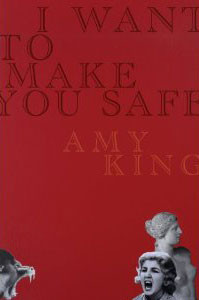
Amy King'due south breathtaking verse reflects the same unwavering commitment she brings to her part at VIDA: Women in the Literary Arts: aesthetics rooted in ideals; community advocacy and intersection. King'south gift, which has earned admiration from John Ashbery amid many others, seems to be about letting the lyric have hold of modern life's messy vibrancy as it falls together seamlessly:
This is what it sounds like exterior,
fat geese and guinea hens holding hands.
I am 31, which is very immature for my age.
That is plenty to realize I'm a pencil that has learned
how to describe the Internet. I explain squiggles
diagramming exactly how I experience and you are drawn to read
in ways you cannot yet. Slow goes the elevate
of cosmos, how what'due south inside comes to be without,
which is the rhythmic erection of essence.
Bhanu Kapil 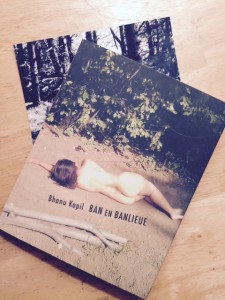
Recently I walked into a classroom where the amazing Evie Shockley had just finished educational activity a class of undergraduates Bhanu Kapil'due south most recent and, to my mind one, of the nigh challenging books of contemporary poetry published in the 21st century. I stood in awe of the ambition to introduce the rigor of this work to beginning poets. Ban en Banlieue, essential reading, stands at the precipice between what is present and absent on a printed page. I often describe Kapil as the kind of author who doesn't settle for only writing the books of poems she intended, but rather their exoskeletons. That is, books that chart her radical procress towards abandoning, revising, self-realizing across fragmentation, self-erasure and the unsayable. Look no farther for a poet to fearlessly interrogate self, displacement, decolonization, geographic and cultural memory. Her weblog, her Twitter, her teaching—are immense resources.
Brian Blanchfield 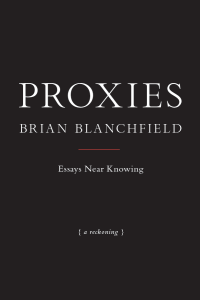
Brian Blanchfield is one more than terrifyingly good gimmicky poet, like Bhanu Kapil, published by Nightboat, one of our most reliably incredible small presses. I confess I oft think of Blanchfield, a gay poet and fellow Hart Crane obsessive, as kind of my older, more than talented brother. His 2nd book of poems,A Several World, was rightfully lauded for its sheer encyclopedic majesty of subject matter. In his new book, part memoir part criticism (think Maggie Nelson),Proxies, he becomes the astonishing chronicler of his own frangible, decaying retentivity. The book is written entirely as he remembers it (where it = friendships, sex, reading, homophobic encounters, tumbleweed), with a brilliant corrective afterward to address the glaring differences betwixt facts and experience every bit he (nosotros) perceived them vs. their objective reality. Simply a brilliant book.
CAConrad 
No poet's presence on social media, nor presence on stage, seems to me more than in keeping with the mystical wavelengths of imagination and reinvention that their ain poems perform than CAConrad'due south. To read, hear, follow Conrad is to exist ever emboldened by a spirit of outrage and mercy, unapologetically queer, staunchly political, quirky and original. Contemporary poetry has proven to me many things in the terminal couple of years: foremost is its insistence that the breakdown betwixt the formal distinctions of page/person, aesthetics/ethics, performance/lyric, is long overdue nonetheless happily currently underway. And amid that much needed breakup, CA leads the fashion. And still one should add, few beings tirelessly champion their fellow poets all beyond this country (and beyond) more than fervently than he does. Bank check out the trailer to this feature documentary on him and his work here.
Carmen Giménez Smith 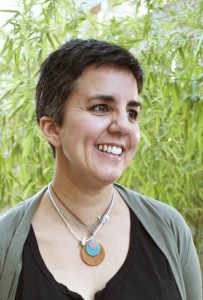
The piece of work of Carmen Giménez Smith for me represents the entire packet of what poets and verse may aspire to: she is a instructor, editor of Noemi Printing (which recently published Douglas Kearney's new book of essays) and radical poetic innovator. Whenever I teach her Latina feminist poems, my students light up every bit if to saythank you for letting us know this too was possible. Recently featured on PEN America's website, her newest work is as much a reckoning of lyric interiority as information technology is a wrecking brawl of courage for social justice. With lines like the post-obit, I volition eagerly expect Smith'due south every publication and project:
I'd once have left
brown behind
having already
left the tribe behind
and her tongue
and the garb
that made me theirs
considering it felt like
leaving hoi polloi
behind to put
behind the father
in my mother's tongue
lingering in the
long and deep vowels
meant I could leave
backside
inferiority complex
not really or always
simply in theoryI leave backside
the house we kept
trying to make expect
like the nation
and the past I know
I'll exit my hurts
behind I promise I'll leave
yours probably not
Cathy Park Hong 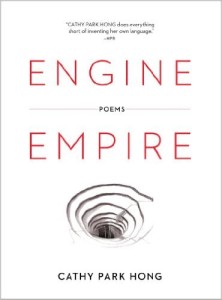
For the last two years especially, poets take modeled for me how sorely every bit a culture we must face up our historical legacies, to bridge the structural and the personal through not but theory and retention, only criticism and creativity. Cathy Park Hong's poetry and essays take had a great affect on communities of poets seeking visibility in their experimentation. Her influential "Delusions of Whiteness in the Avant-garde" published by the amazing journalLana Turnerwas a game-changing piece of writing read by thousands. It signaled to poets of color and white poets alike, that the conversations we're having about race, sometimes in the abstruse, have intimate and immediate consequences forwhose writing get's to exist grouped under the enviable imprint of "experimentalism," whose under the title of "identity politics." But as her poems deconstruct the English'due south global ubiquity, her contempo prose writings accept undermined the preconceived narratives inherent to "indigenous literature." She has become i of our most conscientious voices as well as a poetry editor at theNew Republic to be counted on to reflect the boundless range of American poetics.
Claudia Rankine 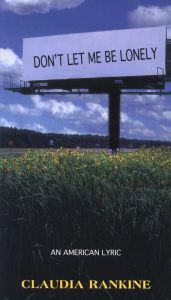
I look up to Claudia Rankine as our most profound and consequential living poet.Citizen—which has now sold close to 200,000 copies, a feat unheard of for any poet let alone one as innovative and uncompromising every bit her—seems a radical re-centering of what is trulynew most 21st century poetics. Modernist, autobiographical, conceptual, collagist, equally filled with art as it is photographic essays, Citizen contains cumulative prose anecdotes that portray the most hidden lyrical aspects of consciousness in the daily wars of anti-black discrimination at big in America. While this work is to my mind a masterpiece future generations volition await back to understand our persistent racial inequalities, her eclectic anthologies and prior collections—peculiarlyDon't Let Me Be Lonedeserve their attention too. Rankine is the apotheosis of poet every bit public force. Be sure to read her recent essays on Serena Williams, black mourning, Thomas Jefferson, white teachers, also every bit her almost contempoNew Yorkerlyric poem, which resounds with the aforementioned unmatched precision and unequalled moral imagination that distinguishes all her writing.
Christopher Soto (aka Loma) 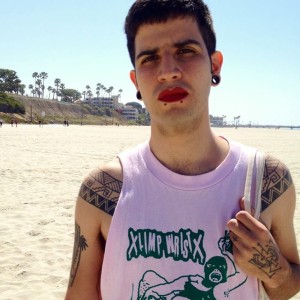
Loma is a cocky-described "queer latinx punk poet & prison abolitionist." They are also ane of the bravest and most precocious young poets out there. With Lambda Literary, they foundedNepantla: A Journal Defended to Queer Poets of Color (previously featured on LitHub) and take made an enormous impact for the well-nigh marginalized voices among us. This spring, they were heralded by Poets & Writers with Javier Zamora and Marcelo Hernandez Castillo. Together the three are known as "The Undocupoets"—a commonage meant to build sensation throughout the literary world about fellow writers denied prizes and publishing opportunities due to their citizenship or legal residency status. Equally if this activism was somehow incomplete, Loma has as well embarked on a entrada to terminate queer homelessness. Be certain to check out Sad Girl Poemsand this verse form published in American Poesy Review:
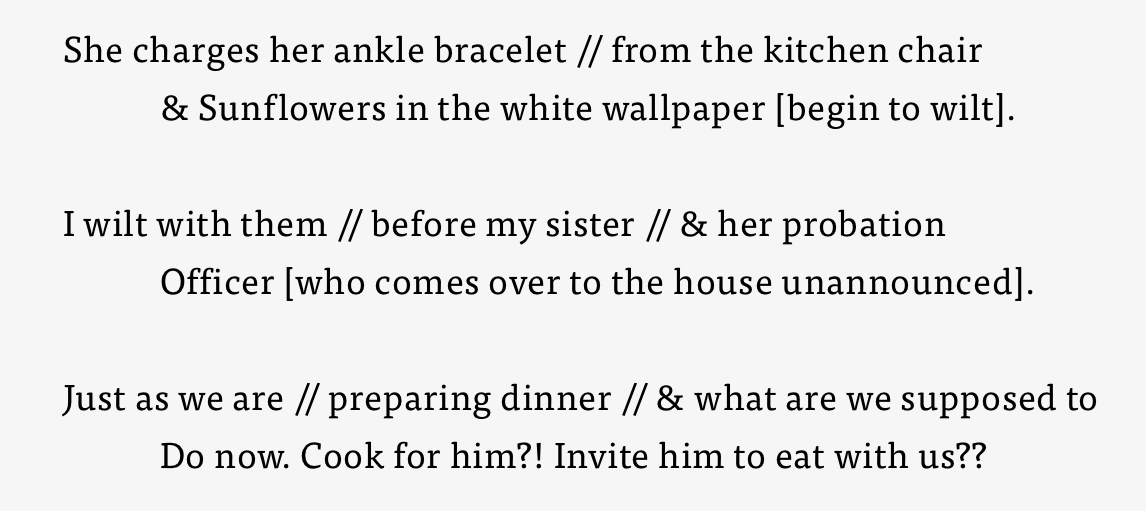
Cynthia Cruz 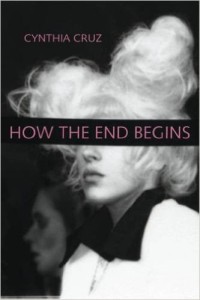
I can think of few poets more haunted past bodily ghosts, in their intellect, imagination, and writing than Cynthia Cruz. Cruz's latest volumeHow the End Begins, which I recall is her best yet, is feverishly populated with the dead female voices upon which her verse not only lives, but thrives. They include Ingeborg Bachmann, Emily Dickinson, Clarice Lispector, Joan of Arc, among others. Yet finally, the strangest haunting is the i this poet plays upon herself. Towards the end of the book, lines, phrases, titles, and, virtually verbatim, entire poems recur, echo. The reader must stumble in the fog of Cruz'southward mischievous hallucinations. It'south a pleasure.
Don Mee Choi 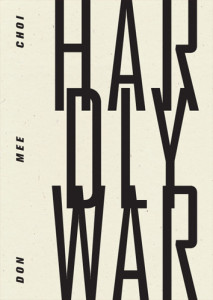
Publishers Weekly is right to track the extraordinary originality of Don Mee Choi's latest volume, Inappreciably War, as part of a larger tradition of experimental Korean-American poesy that includes the legendary Theresa Hak Kyung Cha and Myung Mi Kim (too included on this list). Merely as Kim told me once in person, Cha'southward work includes and so much more than merely poetic works. That's role of what engages and excites me reading/learning to read this newest work. In its combination of artifact, memoir, family photography, textual and visual images, it claims that poetry is both enough and not enough to contain generational narratives. Choi is besides ane of our most acclaimed translators, most notably of Kim Hyesoon's work (which if yous don't know about already, cheque out this recent work care of Choi in the Boston Review.)
Douglas Kearney 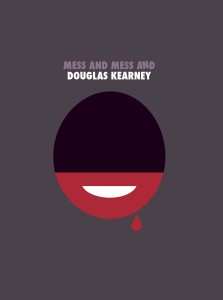
Douglas Kearney is my favorite performer, on or off the page. At the microphone or in front of the camera, Kearney's range of voices and tics, gestures and catamenia, simply command one's accented attention. On the page, Kearney proves to be the most versatile and acrobatic of poets: at i moment concrete, dithyrambic, visually kinetic, mimetic, shapeshifting; some other moment combining topicality in ways no poet has always thought to do so: inPatter, one poem combines minstrel show with the trauma of a miscarriage; while later in the same book, the unabridged projection of the writing is treated in reality Idiot box style. In his new book of essays,Mess And Mess And(whose publisher is as well on this listing, Carmen Giménez Smith), Kearney charts a space of black postmodernist aesthetics that swerves and interrupts plenty to make the entire thought of genre tremble.
Eileen Myles 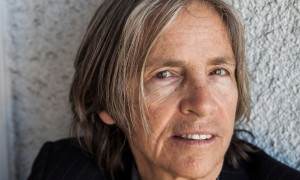
Everywhere you expect these days, the world has taken notice of Eileen Myles. There's been four or five features in The New York Times, well-nigh as many online at The Guardian. The virtually recent, for T Mag, places Myles as the triggering influence for generations of feminist writers and artists. What a relief to come across an experimental dyke poet, I must say, not only getting their due, but aiding in shining the light on those she'southward collaborated with and inspired. The continuing angle in much of her media coverage: she'south finally as famous equally she deserves to be. Just as Myles told me in a recent interview for Interview Magazine: poetry has always been about existence in smaller rooms, that sometimes, equally in her case, add up to a larger cross department of an entire culture or nation. And what'southward something no one's said yet, amidst this lovely drench of attending? I remember it's that her recent poems are actually amid her all-time. She'due south only gets amend.
Fred Moten
To run across Fred Moten'southward idea—a biosphere of poetry, essays, fine art criticism, lectures, is to go deep and wide into the echo chamber of the black radical tradition, often among figures who still remain on the periphery of attention, whether inside or outside of the academy. To Moten, I credit the constant re-direct to Nathaniel Mackey, Walter Rodney, Cedric J. Robinson, Denise Ferreira da Silva, and scores of others. (Though many critics and admirers often describe Moten'south work as "difficult," delight refrain from the bogus scare-tactic of that discussion.) If sociality is a defining concept to Moten'due south evocation of blackness life, his listen has go a seeming-infinite ensemble. We are beyond lucky to be alive in a time when his is the writing we tin exist listening to.
Harryette Mullen 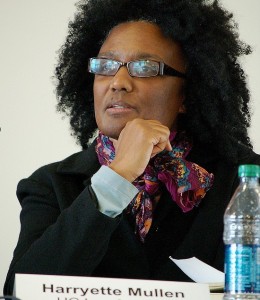
Mullen is perhaps the virtually clear cut example of a pure sonic genius in the landscape of contemporary poetry—an ear like no other, cut partially from the clothe of Gertrude Stein but bringing us back always to the mischievously joy of subversive black poetics. Never has a poet'south proper noun seemed so apt: with its doublings of the letters r, t and l. In her classic poem, "Any Lit," fromSleeping With the Dictionary(1 of the great books of verse form), the mayhem from audio to sound clusters and spills forth such mucilaginous, wily syllables. Who else writes similar this? To jump nonchalantly from "mitochondria" to "Miles Davis" is typical Mullen magic.
You lot are a ukulele beyond my microphone
You are a Yukon beyond my Micronesia
You are a wedlock beyond my meiosis
You are a unicycle beyond my migration
You are a universe beyond my mitochondria
You are a Eucharist beyond my Miles Davis
You are a euphony beyond my myocardiogram
You are a unicorn across my Minotaur
You lot are a eureka beyond my maitai
You are a Yuletide beyond my minesweeper
You are a euphemism across my myna bird
John Ashbery 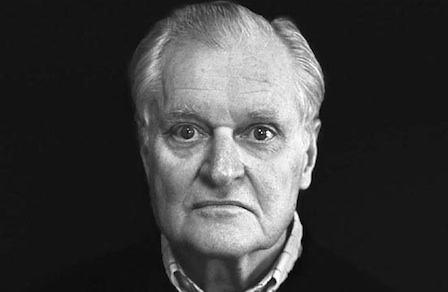
Because Ashbery has been talked about for so long, it'southward like shooting fish in a barrel to forget his latesttardily poesy is among his about playful, queer-brained and intimate. Just equally people adopt to talk well-nigh verse, than consider specific bodily poems, Ashbery is the embodiment of a widely accustomed, however controversial mode of writing that defers our bad addiction of needing pregnant to be singular, firsthand. And so his recent poems and books proceed to be much easier to evade than confront. Nonetheless, in his most recent collection,Breezeway, in that location is a revamping of his bricolage spirits that traffic in the Kardashians equally much as Batman. The media globe of news and headlines is there, of course, but likewise present is the sound of an America that has faded slowly away—a globe born out in the 19th century, awash in radio jingles and black-and-white 'moving pictures.' Poesy akin to The Antiques Roadshow. That he will soon be eighty-nine, and has been publishing now for seven decades are facts that boggle the mind. Only the bittersweet mortality of his Faberge lyrics, portable Cornel boxes, like "A Sweet Disorder," persists to astonish.
Joshua Jennifer Espinoza 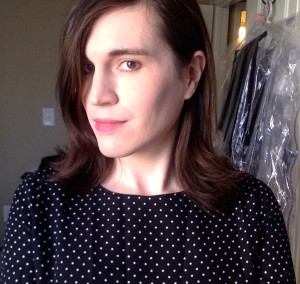
Troubling the Line: Trans and Genderqueer Verse and Poeticswas a historic and monumental album, edited by TC Tolbert and Trace Peterson. And nonetheless in its capacious sampling of 55 poets, it doesn't brainstorm to circumscribe the richness of contemporary trans poets. Joshua Jennifer Espinoza is a perfect instance in signal, of whom Tolbert talks nigh discovering after the anthology was published. Espinoza's commencement full-length collection,I'K ALIVE / IT HURTS / I LOVE ITis a incoherent tour through post-internet aesthetics, where poems can be at once improvisatory, heartbreaking and soulful. Here'due south i case:

Layli Long Soldier 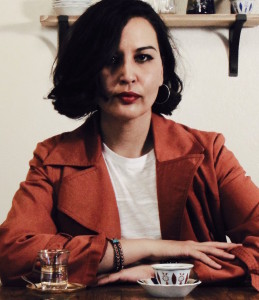
Layli Long Soldier is another poet on this list I know near thanks to the generosity of a fellow poet (in this case, the encyclopedic and vivid Metta Sáma). While most of the poets on this list have already published their first total-length collections, Long Soldier's manuscriptWhereas is forthcoming debut (if anyone knows where I can find her rare chapbook, delight let me know, I volition pay you handsomely!). Yet, online one can read excerpts at PEN (introduced by Maggie Nelson) and at Graywolf Press's website that strike me as a new phonation entering into poetry that not simply I take not heard before, but one that is admittedly uncompromising as information technology is profound. I believe as more readers find her for years to come, this will be only ane of many books of hers we should be eager to conceptualize. Long Soldier's mixture of political reckoning and daring meta-syntax is stunning. Her poem "38" begins:
Here, the sentence will exist respected.
I will compose each sentence with care past minding what the rules of writing dictate.
For example, all sentences volition begin with upper-case letter letters.
Likewise, the history of the sentence will exist honored by catastrophe each one with appropriate punctuation such as a period or question marking, thus bringing the idea to (momentary) completion.
You may like to know, I practice non consider this a "creative piece."
In other words, I do not regard this every bit a poem of great imagination or a work of fiction.
Also, historical events volition non be dramatized for an interesting read.
Therefore, I feel well-nigh responsible to the orderly sentence; conveyor of thought.
That said, I will begin:
Yous may or may non accept heard almost the Dakota 38.
Maggie Nelson 
For the concluding ii years, I've had to scratch my head a petty fleck as some of our most hole-and-corner and important poets finally get the mainstream attention they deserve, not merely amongst august prize-awarding organizations and institutions dedicated to poesy, but among the larger cultural chat itself. Information technology'due south almost like people are finally awake to the news that poetry is reliably six seconds ahead of wherever this insane place called America is heading. Maggie Nelson's The Argonauts is one such example. And yet for those who already know of it, and the cult archetype Bluets, I advise discovering or re-discovering Jane and The Red Parts—ii of import works that personalize the excruciating result of her aunt's murder. Nelson: shape-shifter poet, prose writer, memoirist, culture theorist.
Morgan Parker 
One of the get-go poems published on Literary Hub, Morgan Parker'due south "All They Want Is My Coin My Pussy My Blood" is yet the most viewed poem we've e'er published. For myself, I can call back hearing the poem for the kickoff fourth dimension at The Poesy Project's New Years Twenty-four hours Marathon reading (run by two of our great community-building poets, Stacy Szymaszek and Simone White). It knocked me in my tracks because I felt I was witnessing a new kind of confession—yes, something troubled with emotion recollected in the free space of metaphor, imagery and rhythm. But also a confession that went beyond any specific historical time. Parker'south poetry isn't timeless, if anything, with its ruthless wits and mercurial melancholy, it feels written across multiple timelines, encompassing each of the poet'southward past lives.
Myung Mi Kim 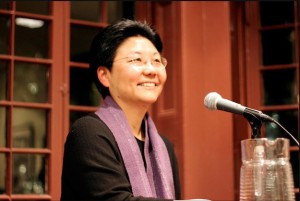
Cathy Park Hong and Dawn Lundy Martin take both cited to me the pedagogy of Myung Mi Kim as i of the transformative moments in their writing lives. Kim teaches her students to call back of the bare page as non only that, but as well a slice of canvas—one that must exist studied and filled, only also emptied. Turning to Kim's masterful work, one realizes where this insistent wisdom comes from. For decades, she has made the spacing of the verse form into a radical act that emphasizes the appearing and disappearing edges trapped behind, betwixt words and syllables. Though her poems can sometimes contain more white space thank ink, I am tempted not to think of her every bit a minimalist since at that place are no poets who forcefulness me to strain then clearly to see the pockets of pauses, breaks and ruptures that just poetry seems capable of allowing for inside the house of linguistic communication.
Natalie Diaz 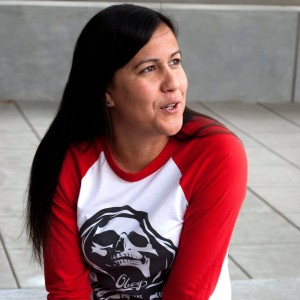
In that location are many now active Native poets transforming the codified, obsolescing traditions of American poesy. Layli Long Soldier (also included on this list) and Orlando White (recommended to me past Myung Mi Kim) are just two incredible examples. Natalie Diaz is yet some other. Much has been written about her works fearless ability to write poems about life on the reservation, basketball game and grief. But for me she is only put one of our great erotic poets. In her stunning poem, "Ode to the Beloved'southward Hips," Diaz weaves together multiple languages, explosive alliteration, and the funkiest of hyperboles. I promise she and her publisher will forgive me for quoting then much hither, which readers should read in its entirety on The The Poesy Blog:
Bells are they—shaped on the eighth twenty-four hour period—silvered
percussion in the morning—are the forenoon.
Swing switch sway. Hold the day abroad a little
longer, a picayune slower, a picayuneeasy. Call to me—
I wanna rock, I-I wanna rock, I-I wanna rock
right now—so to them I come—struck-impaired
chime-blind, tolling with a throat total of Hosanna.
How many hours bowed against this Infinity of Blest
Trinity? Communion of Pelvis, Sacrum, Femur.
My mouth—terrible angel, ever-lasting novena,
ecstatic devourer.O, the places I have laid them, knelt and scooped
the bister—fast honey—from their openness—
Ah Muzen Cab'southward hidden Temple of Tulúm—licked
smooth the sticky of her hip—heat-thrummed ossa
coxae. Lambent slave to ilium and ischium—I never tire
to shake this wild hive, split with thumb the sweet-
dripped rummage—hot hexagonal hole—dark diamond—
to its nectar-dervished queen. Meanad natural language—
come-drunk hum-tranced honey-puller—for her hips,
I am—strummed-song and succubus.They are the sign: hip. And the cosign: a neat book—
the body'south Bible opened upwardly to its Good News Gospel.
Alleluias,Ave Marías,madre mías,ay yay yays,
Ay Dios míos, and hip-hip-hooray.
Nathaniel Mackey 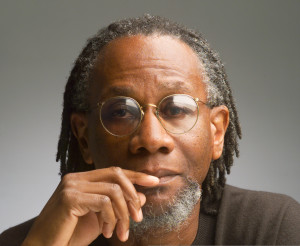
Nathaniel Mackey has been writing poetry for five decades, his first total-length collection Eroding Witness was selected by Michael Harper for the National Poetry Serial. In 2016, arguably no contemporary poet now practicing, with the exception of Harryette Mullen (besides included on this list), has exerted so much influence on radical black poetics. It'southward for good reason that Fred Moten has said that to call him derivative of Nate Mackey would be the highest bachelor praise. In an early interview, Mackey describes discovering the work of William Carlos Williams in loftier school equally a determinative influence, only to Amiri Baraka he gives credit for synthesizing his approach to music, poetry, performance, and much else. Mackey'due south poetry and criticism (of which Paracritical Hingeis the all-time place to start) have reinvented modernism for our time. InBluish Fasa, his most recent poetry collection, he continues his two, ongoing serial poems "Vocal of the Andoumboulou" and "Mu" with a formal dexterity, lyrical musculus and sonic joy. Mind to Douglas Kearney on NPR explain the risks and rhythms of our greatest living ballsy poet.
Phillip B. Williams 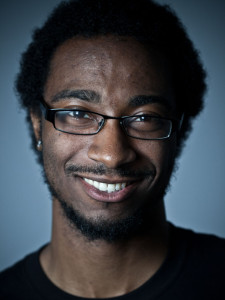
There are many special moments in the life and career of a poet. Perhaps zippo is as special as the first poem in their first book. When I turned to the first folio of Phillip B. Williams' Thief in the Interior, his debut collection, I read the post-obit lines: "Was a vastness over me / like a swell system of clouds pursuing each other, / colliding into i another like fists that bloomed / like devotions like—" I marvel at how this poet's lyricism is total of interruptions—into and out of history, in and out of metaphor, in and out of the violence of being a body. No less than the genius Dawn Lundy Martin has praised this phenomenal piece of work for its ability to "pierce through the gape-mouthed howls produced by the missing gay black trunk and sing a brutal cleaved vocal that energizes and revives the gimmicky lyric." Formal, graphic, elegiac, erotic, Williams is a poet—as in his poem "Sonnet With a Cut Wrist and Flies" demonstrates—willing to practice it all.
Robin Coste Lewis 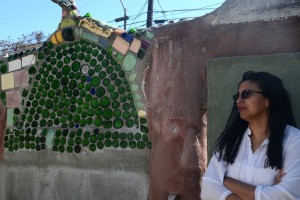
Robin Coste Lewis, whose title poem "The Voyage of the Sable Venus" was featured in part on Literary Hub, is that rare thing—a completely new kind of poetry. Conceptual, historicist, her mosaic of the black female body portrayed or titled throughout Western art is a reclamation project with roots in Robert Hayden's lyric epics. Even so i of my favorite moments occurs very early, with an epigraph of Reginald Shepherd—one of the continuing secrets in American poetry whom sadly died too immature. Shepherd writes, "And never to forget dazzler, / however strange or difficult." Nearly which Lewis, when asked in an interview for Flop magazine, poignantly says:
Solmaz Sharif 
At that place are few books, whether debuts or not, more than anticipated than the publication of Solmaz Sharif'sLook—which Graywolf will publish early this summertime. Sharif'due south political imagination, as the kid of Iranian parents, is able to span continents, timelines, and even state of war zones. Role of what readers respond to is her unflinching gift to face tragedy, inequality, cultural and psychological displacement. What I hear in her title, also as read in her poems, is non only the imperative mandate for poetry to pay attention to the forgotten and marginalized. It's likewise the colloquial sound of someone beginning a conversation to cut through the bullshit of pocket-sized talk, lies, and everyday misrecognitions. Whether writing about erasure or elegizing the inescapable violence of the body, Sharif's poetry is built to outlast the blindnesses of empire.
Susan Howe 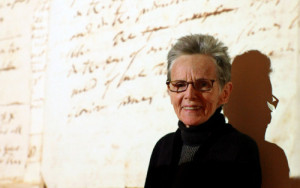
For many years I felt resistant to the genius of Susan Howe'south work. Everything I had been trained to dearest in poetry, the baroque diction and rhetoric of Hart Crane, for instance, seemed challenged by the dry, indexical language of Howe'south bibliographic spirit. And yet with time it has just get some of my favorite work to read, acquire from, and realize how foolish we are when we narrow the definition of poesy to only what we first knew, or in one case imitated. Howe'southward critical poetics are based, like Duchamp'due south, in the powerful way in which we tin can reframe, re-contextualize what has been excluded from our traditional frames of attending. Then when she writes on Emily Dickinson, as she has done throughout her life, there is attention to American history (such as the Indian Wars of the 18th and 19th century)—all that informs (and exceeds) what is merely 'present' on the page. Just Howe's telepathic poetry is also the nigh attentive to materiality: handwriting, spacing, the slightest fold or crevice which might contain fragments, marginalia, a scribble of poesy. And that's just it—Howe's attention is the essential rigor of all poetry.
Timothy Donnelly 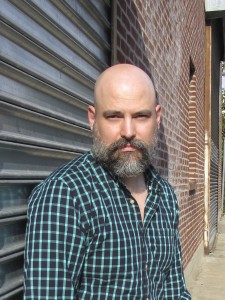
The granddad of civilization critics Theodor Adorno never ceased from warning us virtually our mod living in a totally "administered globe." It'due south a world oft nefarious as it is nebulous. With unbreakable rhythm, the soaring lyrics of Donnelly observe themselves constantly pit against it, expounding our insane lament from feeling almost always trapped inside the machinery of corporate greed, gross environmental decay, consumer ennui. And yet Donnelly'due south sublime melancholy as a poet is, nevertheless, heroic in its indestructible persistence of feeling. His 12-folio poem "Hymn to Life"—a manic, plangent catalogue of mass extinction—is to my heed not only his greatest poem merely 1 of the best nevertheless written in this new century.
Tess Taylor 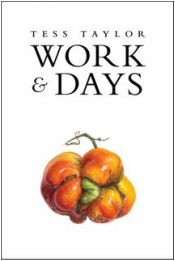
Tess Taylor has just published her 2nd book of poems,Work and Days, featured in role but concluding week on Literary Hub. In it, she explores life on the farm as a would-be female parent while living in the Berkshires. It is a humbling, lapidary, moving book that for me shows that beyond thousands of years, these smallest acts—to grow, harvest, mourn—yet remain central to lyric utterance. Is such a pastoral sensibility possible in the mediated earth of 21st century American life? Taylor's answer is not simply yes, merely to focus on the thousands of workers both here and abroad who alive a life based on laboring with the earth. These subtle poems, like those that explore her lineage to the Jefferson family unit in her first book, are not without harder-to-face agonies. As she draws the world closer, proximate to touch on, the intuited sense of apocalypse—whether ecological disaster, or global political chaos—draws fifty-fifty closer.
TC Tolbert 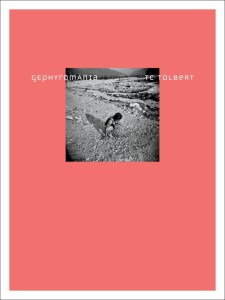
Ane of the great things about existence a poet is having poet friends constantly telling you who should be reading, what book has entered their orbit and refuses to leave. Thanks to Eileen Myles, TC Tolbert's Gephyromaniais i of those books I now know and love. Such readership that's rooted in constant sharing, what Lewis Hyde refers to as the gift economic system of artists and poets, is something I also know that Tolbert knows well, as co-editor, with Trace Peterson, ofTroubling the Line: Trans and Genderqueer Poetry and Poetics.Its an anthology, the first of its kind in scope and calibration, that non only celebrates trans and genderqueer poetics but allows for large sampling of poems as well as statements by the poets included to dilate, in yet some other way, the richnesses of gender perspectives in American poetry. The discoveries to be had in that location are akin to Tolbert'south own formally challenging poetry. Read this excerpt and interview at PEN'south website to run across why s/he is one of our most innovating poet minds.
Tyehimba Jess 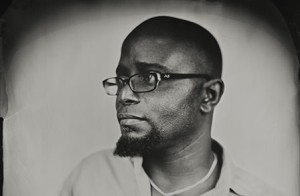
It was my male parent who first gave me the beloved of poetry—once defining to me what a poem was as "something you must read at least twice earlier you can say annihilation nearly it." He also loved Mississippi and Texas blues. In Tyehimba Jess's new poetic masterwork,Olio, the ancestry of 19th century black music and politics is explored in the most original and encompassing treatment I think a poet has ever attempted. Jess turned, importantly, primarily to musicians who did not live to have their voices recorded on wax cylinder or vinyl. Instead, hisOlio is a mixture of dialogues, interviews, reportage, found text, sonnets, fractured sonnets, appropriations, and believe when I say much much more, that reveals nearly a decade'south worth of work in bearing witness to the kickoff generation of freed slaves and their relationship to what he calls "liberty songs." The volume, which reads like a compendium of thousands of forgotten or simply partially remembered lives, too includes artwork and pages which need to be cut out and folded into various geometrical shapes to explode the possibilities of what information technology means to "read," "hear," or "run into" poetry. Available this month,Oliois the very best of what American poetry still has in store for us.
Mind: Claudia Rankine talks to Paul Holdengräber about objectifying the moment, investigating a subject area, and accidental stalking.
What Is A Contemporary Poet,
Source: https://lithub.com/30-poets-you-should-be-reading/
Posted by: kingrepasustem.blogspot.com

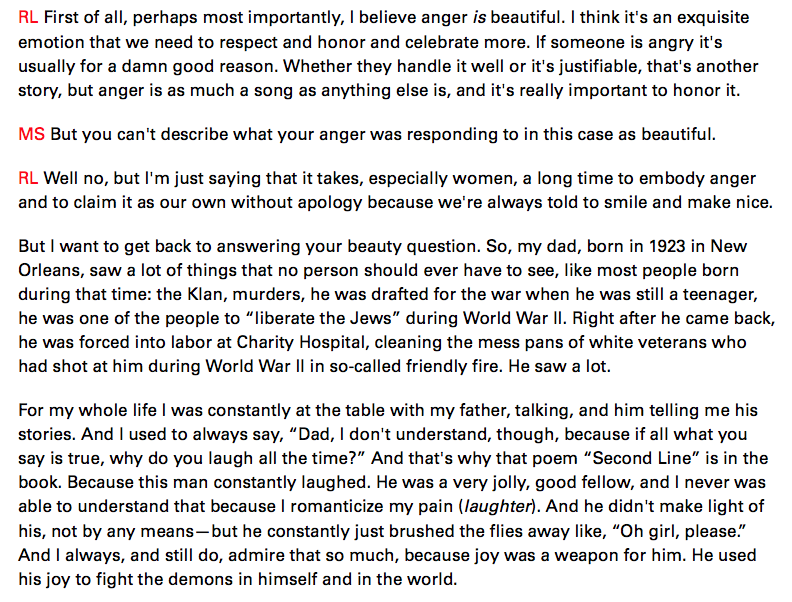

0 Response to "What Is A Contemporary Poet"
Post a Comment